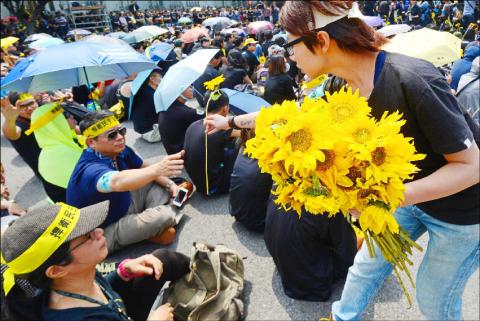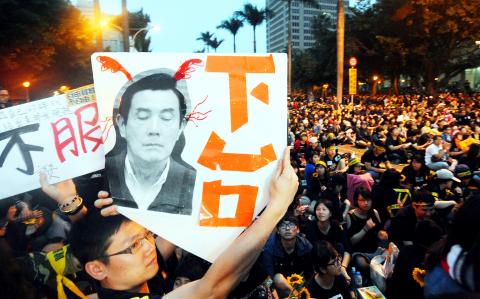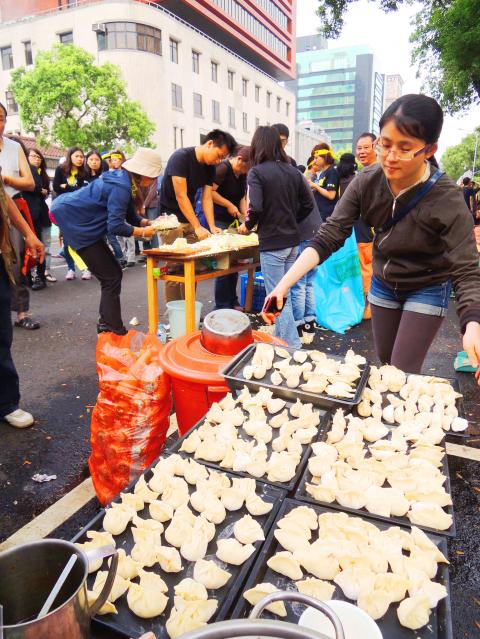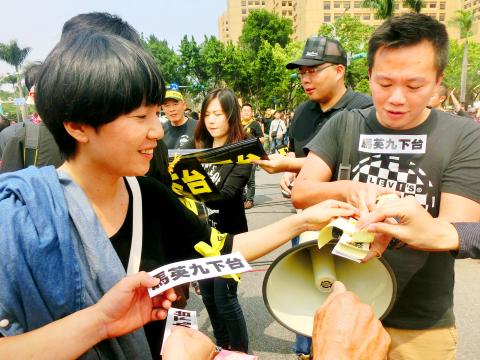From all walks of life, supporters of the “Sunflower student movement” took to the street in Taipei yesterday, marked by festivity, diversity and order.
An hour before the scheduled start of the event at 1pm, the “black-clad army” — dress code for the protest against the government’s handling of the controversial cross-strait service trade pact — emerged from nearby MRT stations and packed the designated protest site in front of the Presidential Office Building on Ketagalan Boulevard.
“I am here to support these students. I’m here out of guilt because people of my generation have done too little. We owe these kids a better Taiwan,” said Chiu Shih-lung (邱仕龍), who is in his 70s.

Photo: Sam Yeh, AFP
Chiu, who came from Greater Kaohsiung, said he supported the students’ cause of safeguarding Taiwan’s democracy and demanding the withdrawal of the cross-strait service pact because “it endangers national security and sovereignty.”
“We must safeguard our island’s interests,” said Chin Mei Ching, a 29-year-old mother who was pushing her one-year-old daughter in a buggy. “We have to guard against China using the economy to control us.”
The majority of the protesters were students and young people.

Photo: Lo Pei-der, Taipei Times
They brought sunflowers, a symbol of the protests, and wore yellow ribbons that read “Fight for democracy, retract the service trade pact.”
Some posed with self-made banners, on which were slogans such as “Condemn state violence” and “I don’t want the service trade pact,” or demanding President Ma Ying-jeou (馬英九) and Premier Jiang Yi-huah (江宜樺) step down.
Alliance of Civil Action Against Ma Ying-jeou spokesperson Shen Chih-lin (沈志霖) stood in the crowd and gave out stickers that read: “Ma Ying-jeou step down” (馬英九下台).

Photo: Chang Wen-chuan, Taipei Times
Shen said he prepared 1,500 of the stickers and distributed them near the Jingfumen (景福門), which directly faces the Presidential Office Building, and 500 of them were taken by eager protesters in the space of one minute.
A man disappointed with Ma’s failed governance suggested Shen print a sticker that read: “Nine percent approval rating, Ma Ying-jeou step down,” adding: “How can Ma govern the nation or gain trust from the people with such a low approval rating?”
Separately, students from Taipei National University of the Arts brought 3,000 sunflower brooches they had made and gave them out to the protesters.

Photo: Lee Hsin-fang, Taipei Times
The students said that about 10 students worked on the brooches from 6pm on Saturday until early yesterday, with NT$30,000 of funds they had raised.
Half of the brooches were given out within 10 minutes, near NTU Hospital MRT Station’s exit No. 1, at 1pm. The students said they kept the rest for distribution at the legislature.
Like their peers at the week-long sit-ins around the legislature compound, besieged by students and other activists and protesters since March 18, university professors made the street their classrooms, holding discussions and having students express their views about the trade deal with China.
A student spoke through a loudspeaker to his classmates from Soochow University, saying that he believed young people “would see a different face of society when they are on the street” and that would be at least as meaningful — if not more meaningful — as studying in the library or doing laboratory research.
Designer Chiang Lin Chia-jen (姜林家真) held a handmade, helmet-shaped umbrella that read: “Don’t hit my head” to protest against the violence the government used against unarmed student protesters at the Executive Yuan on Monday morning.
In front of the Legislative Yuan, a university junior student surnamed Hu (胡) set up a tent with a sunflower painted on it, inviting protesters to help use their fingerprints to color the sunflowers — to symbolize that the student movement is a result of the gathered strength of the people.
Many people lent their fingerprints, and the painting was almost finished by noon.
Hu said she had taken pictures of everyone who left a handprint on it, and that she will upload the photographs and the final painting on a Facebook page, in memory of “the year we stood up for the student movement.”
Yesterday’s protest was aimed at more than just the trade agreement, which was unilaterally passed through its committee without deliberation by Chinese Nationalist Party (KMT) lawmakers on March 17 and sparked the student-led movement, as non-governmental organizations (NGOs), which worked with the students to organize the protest, also took the opportunity to promote their causes.
A total of 22 NGOs, which focused on a wide range of social issues, such as gender, education, culture and environment, set up booths on Zhongshan S Road.
The student movement has received strong support for a reason, Northern Coast Anti-Nuclear Action Alliance chief executive Kuo Ching-lin (郭慶霖) said.
“People support the movement because they understand that Taiwan has a long way to go as a democracy. For years, the government had always made unilateral decisions without consulting the people, such as the construction of nuclear power plants and nuclear waste storage sites,” Kuo said.
“Most people no longer trust the government,” he added.
Politicians have taken a back seat in the protests, with Democratic Progressive Party (DPP) heavyweights choosing to participate in the protest quietly, without drawing too much attention.
Wearing a black shirt, DPP Chairman Su Tseng-chang (蘇貞昌) said he attended the event as a citizen, while former DPP chairperson Tsai Ing-wen (蔡英文) praised the students’ courage and discipline and urged Ma to ease people’s suspicions by making substantial promises.
The DPP Central Committee had instructed its members who plan to take part in year-end elections not to attend the demonstration wearing their campaign vests.
In addition, election flags and campaign vehicles were prohibited at the protest sites.
Additional reporting by Huang Hsin-po and agencies

Conflict with Taiwan could leave China with “massive economic disruption, catastrophic military losses, significant social unrest, and devastating sanctions,” a US think tank said in a report released on Monday. The German Marshall Fund released a report titled If China Attacks Taiwan: The Consequences for China of “Minor Conflict” and “Major War” Scenarios. The report details the “massive” economic, military, social and international costs to China in the event of a minor conflict or major war with Taiwan, estimating that the Chinese People’s Liberation Army (PLA) could sustain losses of more than half of its active-duty ground forces, including 100,000 troops. Understanding Chinese

The Ministry of Foreign Affairs (MOFA) yesterday said it is closely monitoring developments in Venezuela, and would continue to cooperate with democratic allies and work together for regional and global security, stability, and prosperity. The remarks came after the US on Saturday launched a series of airstrikes in Venezuela and kidnapped Venezuelan President Nicolas Maduro, who was later flown to New York along with his wife. The pair face US charges related to drug trafficking and alleged cooperation with gangs designated as terrorist organizations. Maduro has denied the allegations. The ministry said that it is closely monitoring the political and economic situation

UNRELENTING: China attempted cyberattacks on Taiwan’s critical infrastructure 2.63 million times per day last year, up from 1.23 million in 2023, the NSB said China’s cyberarmy has long engaged in cyberattacks against Taiwan’s critical infrastructure, employing diverse and evolving tactics, the National Security Bureau (NSB) said yesterday, adding that cyberattacks on critical energy infrastructure last year increased 10-fold compared with the previous year. The NSB yesterday released a report titled Analysis on China’s Cyber Threats to Taiwan’s Critical Infrastructure in 2025, outlining the number of cyberattacks, major tactics and hacker groups. Taiwan’s national intelligence community identified a large number of cybersecurity incidents last year, the bureau said in a statement. China’s cyberarmy last year launched an average of 2.63 million intrusion attempts per day targeting Taiwan’s critical

AGING: As of last month, people aged 65 or older accounted for 20.06 percent of the total population and the number of couples who got married fell by 18,685 from 2024 Taiwan has surpassed South Korea as the country least willing to have children, with an annual crude birthrate of 4.62 per 1,000 people, Ministry of the Interior data showed yesterday. The nation was previously ranked the second-lowest country in terms of total fertility rate, or the average number of children a woman has in her lifetime. However, South Korea’s fertility rate began to recover from 2023, with total fertility rate rising from 0.72 and estimated to reach 0.82 to 0.85 by last year, and the crude birthrate projected at 6.7 per 1,000 people. Japan’s crude birthrate was projected to fall below six,